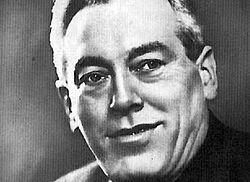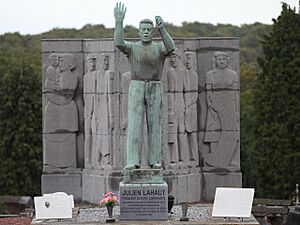Julien Lahaut facts for kids
Quick facts for kids
Julien Lahaut
|
|
|---|---|

Portrait of Lahaut
|
|
| Chairman of the Communist Party of Belgium | |
| In office 1945–1950 |
|
| Personal details | |
| Born | 6 September 1884 Seraing, Belgium |
| Died | 18 August 1950 (aged 65) Seraing, Belgium |
| Cause of death | Assassination |
| Political party | Communist Party of Belgium |
| Occupation | Politician |
| Military service | |
| Allegiance | Belgium |
| Branch/service | Belgian Army |
| Years of service | 1915 - 1918 |
| Unit | Belgian Expeditionary Corps |
| Battles/wars |
|
Julien-Victor Lahaut (born September 6, 1884 – died August 18, 1950) was an important Belgian politician. He was a communist leader and served as the head of the Communist Party of Belgium from 1945 to 1950.
Lahaut was a key figure during World War II, especially when Germany occupied Belgium from 1940 to 1944. After the war, he strongly believed that Belgium should not have a king or queen. This idea was part of a big political debate called the Royal Question.
He was sadly killed in August 1950, when the Royal Question was at its most intense. Many people thought Belgian supporters of the monarchy were responsible. However, his death is still officially unsolved.
Contents
Julien Lahaut's Early Life and Politics
During World War I, Julien Lahaut served in the Belgian army. He was part of a special group called the Belgian Expeditionary Corps in Russia. This group fought alongside Russian forces on the Eastern Front.
After the war, Lahaut returned to Belgium. He joined the new Communist Party of Belgium. He quickly became an important member of parliament, known as a deputy. Later, he became the chairman of the party. He was very open about his belief that Belgium should be a republic, meaning it should not have a king or queen.
Lahaut During World War II
During the German occupation of Belgium from 1940 to 1944, Lahaut led the Communist Party. He helped organize a major protest called the Strike of the 100,000 in May 1941. Because of his actions, he was arrested by the Germans.
He tried to escape from the Citadel of Huy, a fortress where he was held. But he was not successful. He was then sent to a very harsh prison camp called Mauthausen concentration camp. Even though he became very ill, he was still alive when the camp was freed by the Allies in 1945.
The Royal Question and Lahaut's Death
After Belgium was freed from German control, there was a long political problem. This was called the Royal Question. It was about whether King Leopold III should return to his throne. The King had surrendered to Nazi Germany in 1940, and many people were unhappy with this decision.
The problem became very serious in 1950. King Leopold III returned to Belgium. But he soon had to let his son, Baudouin, take over his royal duties. A year later, King Leopold officially gave up his throne for Baudouin.
The "Long Live the Republic!" Shout
On August 11, 1950, Baudouin took an oath to become the new leader. This happened in front of both parts of the Belgian Parliament. During this important moment, a communist member of parliament shouted, "Long Live the Republic!"
Many people believed that Julien Lahaut was the one who shouted this. However, it was a confusing moment, so it was never fully confirmed.
Lahaut's Assassination
Just one week later, on August 18, 1950, Julien Lahaut was killed. Two unknown gunmen shot him outside his home in Seraing.
Lahaut's death happened at the end of this big political crisis. It caused a lot of anger, especially among people who supported left-wing ideas. Workers organized strikes across the country. About 300,000 people attended his funeral. The Communist Party newspaper, Le Drapeau rouge, printed a headline that said: "A monstrous crime! Our dear comrade Julien Lahaut, leader of the Communist Party, was assassinated last night."
Later, a Belgian supporter of the monarchy named François Goossens was identified as one of the killers. But it is still not certain if he was the one who fired the gun.
Later Tributes
Years later, in 1993, a similar event happened. Baudouin's brother, Albert II, took his oath as the new king. A politician named Jean-Pierre Van Rossem shouted, "Long live the republic of Europe, long live Julien Lahaut!" This showed that Lahaut's memory was still important to some people.
In 2012, the Belgian Senate decided to support a study. This study would look into the historical details of Lahaut's assassination. The government also gave money to help fund this important research.
See also
- Royal Question
 | May Edward Chinn |
 | Rebecca Cole |
 | Alexa Canady |
 | Dorothy Lavinia Brown |


